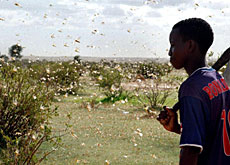Swiss welcome democracy in Liberia

The Swiss government's aid agency says the recent elections in Liberia have been positive but a lot of work is required to turn the country around.
The Swiss Agency for Development and Cooperation (SDC) argues that United Nations peacekeepers must stay in the country once the civil unrest has died down.
Ellen Johnson-Sirleaf, Liberia’s former finance minister, became the first woman to be elected head of state of an African country on Wednesday.
Official results from the run-off on November 8 showed the Harvard-trained World Bank economist beat soccer millionaire George Weah by winning 59.4 per cent of valid votes, compared with Weah’s 40.6 per cent.
“Whatever the result was, it’s good that it’s come from elections that went properly, not like the last ones,” Daniel Rychner, head of the SDC’s regional coordination office in neighbouring Sierra Leone, told swissinfo.
But Rychner, who visits Liberia at least once a month, added that Johnson-Sirleaf, a 67-year-old veteran of Citibank and the United Nations, faces stiff challenges.
“The problems are so big and there was such a long period of unrest,” he said. “You just have to go to Monrovia [the capital] – there’s no power, there’s no water, a lot of the buildings have been destroyed and the roads are in a terrible state. It will take a long time.”
Focus
Unemployment in Liberia runs at 80 per cent. Much of the 3.5 million population is illiterate, hundreds of thousands still live in relief camps and many in the educated class are living overseas.
Infrastructure across the country crumbled during a civil war from 1989-2003 that killed an estimated 250,000 people.
However, this shattered infrastructure is not the SDC’s primary concern.
“We’re focusing on all the vulnerable groups, including women and children. That’s our main objective,” Rychner said.
“We’re working mainly with NGOs. For example, we are supporting the Liberian Red Cross and a rehabilitation centre for children and young women who have been affected by war.”
Challenge
The elections were the first since the end of the civil war – and international observers have said they were largely free and fair, with only a few minor irregularities.
Some 15,000 UN peacekeepers are now ensuring calm in Liberia, where angry Weah supporters clashed with UN troops.
But Rychner doesn’t think there will be major unrest. “It’s not possible with the big programmes of the UN. There might be some small reaction but in general the UN is in control of the country’s security.”
The danger is that donor countries funding the UN peacekeepers, seeing an increase in peace in Liberia, could pull out to concentrate elsewhere. Rychner said this would be a mistake.
“It’s too early to leave now, that’s clear,” he said. “But that’s the way the Security Council works – they will review the situation every six months.”
As for the long-term future, Rychner says that to have durable peace you need to solve the root problems. “You have to tackle corruption; you have to tackle governance issues.”
He adds: “You have to make the environment such that private investors will come in, because without donors’ money you will not develop the country.”
“There is a lot of work to do.”
swissinfo
Liberia has a population of around 3.5 million. More than 500,000 are internally displaced and around 320,000 have sought refuge in neighbouring countries.
Liberia is rich in iron ore and gold. Rubber, timber, coffee and cocoa are other main exports.
Between 1997 and 2001 the SDC contributed SFr9.1 million ($7 million) towards humanitarian assistance in Liberia, with a particular emphasis on children.
The budget for Liberia for 2004-2005 is around SFr6 million.
It has coordinated its programmes for the sub-region through a regional co-ordination office in Freetown, Sierra Leone, since October 2001.
Part of the SDC’s contributions to Liberia goes to UN Agencies (the UN Refugee Agency and the World Food Programme) and to the International Committee of the Red Cross.

In compliance with the JTI standards
More: SWI swissinfo.ch certified by the Journalism Trust Initiative











You can find an overview of ongoing debates with our journalists here . Please join us!
If you want to start a conversation about a topic raised in this article or want to report factual errors, email us at english@swissinfo.ch.